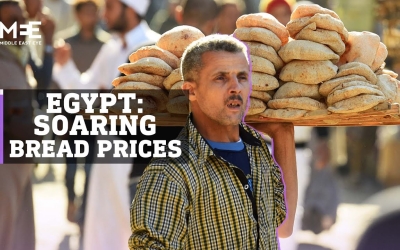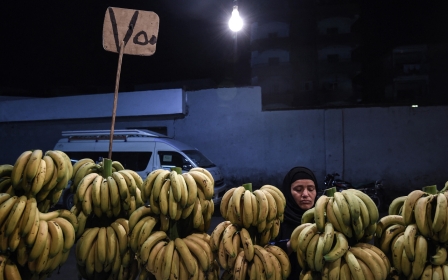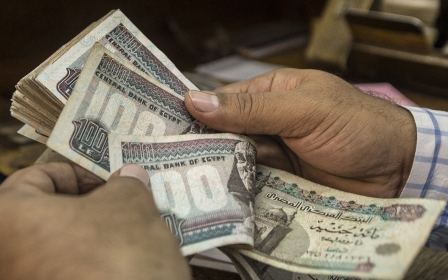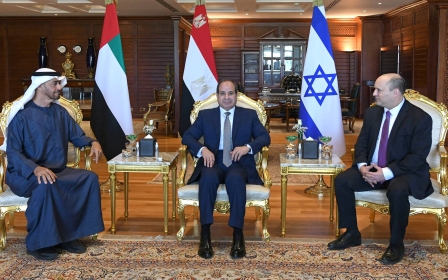Russia-Ukraine war: Egypt seeks support from Arab states, IMF to curb capital flight
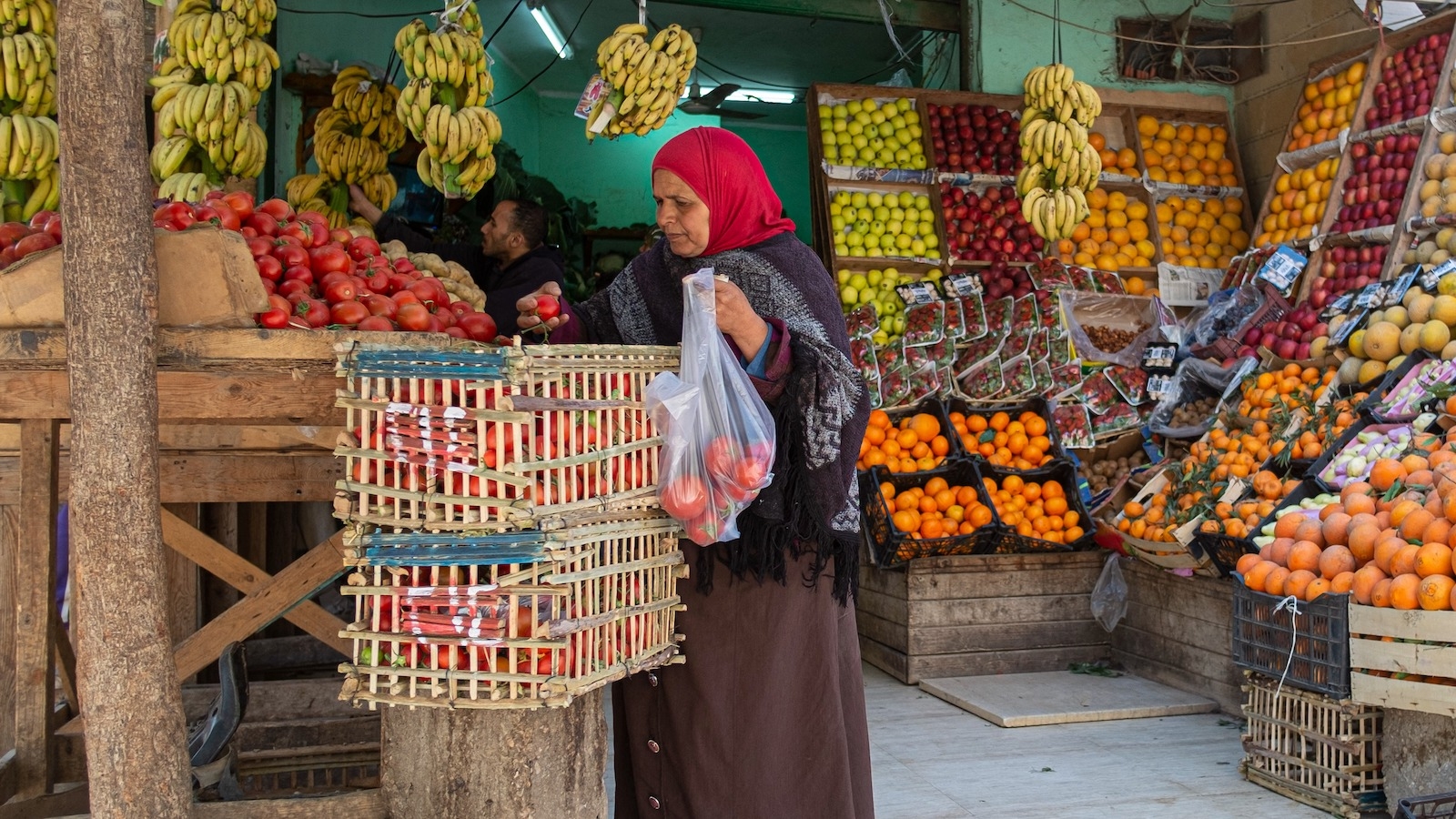
Egypt’s economy is sorely feeling the effects of the Russia-Ukraine war, which has devastated the country's sources of foreign currency and caused the flight of billions of dollars from the Egyptian market.
The Egyptian government has said it’s planning for a worst-case scenario, and is in talks with the International Monetary Fund (IMF) about potential funds in addition to technical support to hedge against the economic effects of the Ukraine conflict if it is prolonged.
Despite the recent sharp decline of Egypt’s net foreign assets (NFAs), there’s a sense of optimism as Cairo turns to neighbouring Arab states for support in bringing its economy back on track.
New considerations
Just days following Russia's invasion of Ukaine, foreign investors fleeing emerging markets sold around $1.19bn of Egyptian treasury bonds.
'We need to search for new markets and also reconsider political conditions around the world to avoid harm to the economy from any potential crises'
- Khaled al-Shafie, Capital Center for Economic Studies
The war in Ukraine has left Egypt facing higher costs for its substantial wheat import needs as well as a loss in tourism revenue from Russian and Ukrainian visitors to Red Sea resorts.
Tourists from Russia and Ukraine make up the bulk of visitors to the Arab country, traditionally constituting almost a third of the 12 million tourists who visited in peak years. A sizeable portion of the nation's agricultural exports, including potatoes, also go to Russia and Ukraine.
"We need to search for new markets and also reconsider political conditions around the world to avoid harm to the economy from any potential crises,” Khaled al-Shafie, the head of local think tank Capital Center for Economic Studies, told Middle East Eye.
In February, Egypt's net foreign assets went sharply down by $3.29bn. The drop was the latest in a series and the highest in seven months, bringing total NFAs to minus $2.9bn, according to the Central Bank of Egypt.
Any movement in NFAs could represent changes in import or export flows, foreign portfolio outflows, repayment of foreign debt, changes in the flow of worker remittances or a slowdown in tourism, analysts said.
This is a worrying development, especially in the context of a country like Egypt where dependence on hot money and deposits by other states for the repayment of debt is high.
And the US dollar is the main import and export currency in Egypt.
While the central bank may have taken the “necessary measures to ensure its ability to honour national financial obligations to other parties”, more must be done, said one analyst.
“We need to work really hard to attract investments and set the tourism sector into motion to compensate for the losses sustained by the sector as a result of the Russian-Ukrainian war,” Huda al-Malah, the head of think tank, International Center for Economic Consultancy and Feasibility Studies, told MEE.
Action plan
In recent weeks Egyptian authorities have made several moves to prevent the weakening of the national currency against the flight of capital and to keep investments coming into the country.
The measures included the devaluation of the Egyptian pound by 14 percent and raising the interest rate by 1 percent.
Minutes after the interest rate rise, the two largest state-owned banks offered saving certificates with a maturity of one year and an interest rate of 18 percent. Since then, the two banks have already collected hundreds of billions of pounds from ordinary people.
The devaluation of the national currency has also already caused commodity prices across the board to shoot up, compounding the suffering of tens of millions of people in a country where over 70 percent of the population depends on food rations.
Economists warn that the move could have serious repercussions for investment, market activities, and the country’s unemployment rate.
"The devaluation of the exchange rate of the pound will necessarily affect ordinary consumers and we have started to see this already in the rise of commodity prices," Yumn al-Hamaqi, an economics professor at Cairo University, told MEE.
"The government needs to increase the commodities on offer to rein in the prices.”
The Egyptian government is also reportedly prepared to introduce a new austerity package, which will ask various ministries to review their spending and strictly limit budgets for new projects.
Furthermore, Egypt has filed for a new loan from the IMF which may potentially come with new conditions such as austerity measures and structural adjustments, although Finance Minister Mohamed Maait has said the deal does not include "any additional burdens on Egyptian citizens".
Arab investments
Some of Egypt’s neighbours have rushed to its aid to help stabilise the Egyptian pound’s exchange rate against foreign currencies.
Just last week, Saudi Arabia deposited $5bn in the Central Bank of Egypt and is expected to invest further as the Ukraine war adds to the pressure on the Egyptian economy.
Other Arab countries are promising billions of dollars in investments, including Qatar which has pledged an investment of $5bn in the coming few years, adding to the billions of dollars Doha has already invested.
'We do not intend to invest in one field (in Egypt), but rather to diversify investments in a way that benefits the two peoples, and not only achieves the benefit for the investor'
- Essam bin Saeed, Saudi minister
Economic support from Arab nations to Egypt is crucial especially now, given “Egypt's importance as a central state in the Arab region”, said Mohamed Abdelhamid, a member of the Economic Committee in the Egyptian parliament.
"These deposits and investments will increase foreign currency reserves and consequently contribute to stabilising the exchange rate of the Egyptian pound against the US dollar,” Abdelhamid told MEE.
Egypt's delicate economic situation is also opening the door for competition among Arab states for the acquisition of state assets.
For several years, the UAE has been actively working towards securing a foothold in various sectors of the Egyptian economy. It now plans to buy two of the nation's most important fertiliser companies.
The Emiratis are also setting their eyes on stakes owned by the Egyptian government in major banks.
Saudi Arabia also plans to buy several state assets, within a package of investments worth $10bn in the coming period.
“We do not intend to invest in one field, but rather to diversify investments in a way that benefits the two peoples, and not only achieves the benefit for the investor,” Essam bin Saeed, a member of the Saudi cabinet and minister of state for Shura Council affairs, was quoted as saying by local media.
Recently the head of Egypt's Sovereign Fund revealed that some Gulf countries had also shown interest in buying shares owned by the Egyptian army in some of the nation's electricity plants.
Hopes and fears
With financial help from Arab nations, through deposits in the central bank and promised investments, Cairo is feeling hopeful, despite some observers predicting that such support will not bear fruit until the beginning of next year.
However, the sale of state assets is causing anger among local analysts, with one accusing the government of allowing companies that make vast contributions to the Egyptian economy to fall into foreign hands.
Others warn against the political fallout from allowing regional states to control Egypt’s economy, especially given the existing divergent interests between Egypt and these nations.
Nevertheless, informed Egyptian sources such as Abdelhamid, the parliament member, play down such fears.
"These are mere investments that will bring in foreign currency and create jobs… The attraction of investments reflects the strength of the national economy and there are strict laws that regulate these investments,” Abdelhamid said.
Middle East Eye propose une couverture et une analyse indépendantes et incomparables du Moyen-Orient, de l’Afrique du Nord et d’autres régions du monde. Pour en savoir plus sur la reprise de ce contenu et les frais qui s’appliquent, veuillez remplir ce formulaire [en anglais]. Pour en savoir plus sur MEE, cliquez ici [en anglais].


